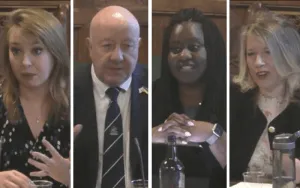Stigmatising views, inaccessible public transport, a lack of job and volunteering opportunities, and the failure of schools to make reasonable adjustments, all contribute to the loneliness experienced by young disabled people, according to new government research.
The research found that the impact of loneliness on young disabled people was “wide-reaching”.
Many young disabled people felt their impairment caused their feelings of loneliness by limiting their opportunities to make social connections.
That loneliness then increased their feelings of depression and anxiety, which in turn contributed to worsening health and decreased their motivation to leave their home, attend college or university, or see their friends.
One young disabled person told the researchers of this cyclical relationship between loneliness, disability and social connection: “[When I feel lonely] it makes me more anxious to hang out with people, and it probably makes me more likely to avoid it – which is like a vicious cycle, I guess, because then I feel more isolated.”
The research was commissioned by the Department for Culture, Media and Sport under the last government, and carried out by NatCen Social Research and RSM UK Consulting.
Some of the young disabled people interviewed had been able to build social connections, for example by joining clubs, using dating apps, or through work, education, volunteering, or youth groups.
Some preferred to connect with friends online, as this was more accessible than meeting face-to-face, including some of those with visible impairments, who had received negative comments about the way they looked.
One told researchers: “I get anxious and embarrassed about the problems that I have, so I find it easier to talk to people online because they can’t judge me, so I’ve got that screen to hide behind.”
Others found that social media allowed them to make friends with people with the same impairment.
But other young disabled people preferred to connect in person, including those who struggled to communicate digitally.
One of the interviewees said: “I struggle with messaging people, and in this day and age, it’s quite important.
“So communicating over text, that stops me, and then that makes people fall out with me because they think, well, she’s just ignoring me, but it’s just too much… by the time I’ve done one message, I’m already drained.
“So that affects my relationships because I can’t communicate that way.”
The researchers interviewed nearly 50 disabled people in England between the ages of 16 and 24, many of whom had experienced feelings of loneliness.
Among the barriers they faced were “stigmatising” views expressed by peers and potential friends, by medical and education professionals, and by family members.
One said: “I definitely had some really difficult friends in that time who didn’t believe I was ill, or would be like, ‘Oh, you’re just so lucky you don’t get to come in [to school],’ and would just make really cutting remarks… I still find it really difficult.”
Others faced inaccessible public transport or venues for socialising, a lack of opportunities to secure employment or internships, or being excluded from school trips for access reasons.
Some of those interviewed also reported barriers to accessing support that might have helped them build social connections or reduce loneliness.
Among the report’s recommendations were for improved provision and funding of groups and youth clubs; better accessibility in education settings; more accessible work and volunteering opportunities; and the need for further research into the support available to young disabled people, particularly in key transition periods in their lives such as the move from education to employment.
Picture: Disabled student Sarah-Marie da Silva, who described in 2020 how she had been left “isolated” and “segregated” by her university’s failure to make her lectures accessible to her
A note from the editor:
Please consider making a voluntary financial contribution to support the work of DNS and allow it to continue producing independent, carefully-researched news stories that focus on the lives and rights of disabled people and their user-led organisations.
Please do not contribute if you cannot afford to do so, and please note that DNS is not a charity. It is run and owned by disabled journalist John Pring and has been from its launch in April 2009.
Thank you for anything you can do to support the work of DNS…

 Disabled peers speak of ‘daily fight’ against access barriers in House of Lords
Disabled peers speak of ‘daily fight’ against access barriers in House of Lords Lords is ‘aeons ahead’ of Commons on access, disabled MP tells colleagues
Lords is ‘aeons ahead’ of Commons on access, disabled MP tells colleagues Forgotten and abandoned, young disabled people are fighting back against cuts through a new collective
Forgotten and abandoned, young disabled people are fighting back against cuts through a new collective